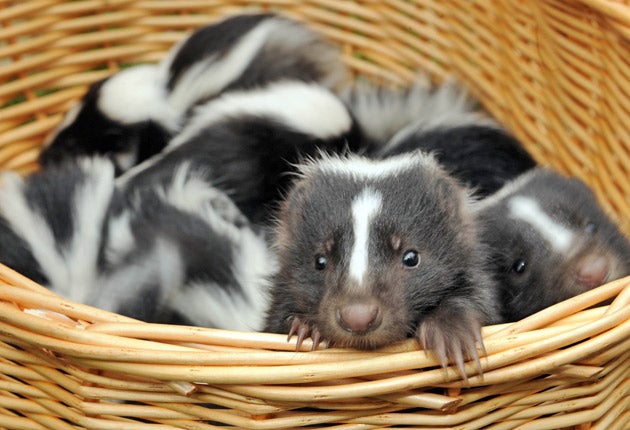A stink in the tale: Why Britain is swooning over the pet with a pong
The skunk might seem an odd choice for domestication, but Tom Peck is smitten

One look and she's got you, hook, line and stinker.
The little thing is unutterably adorable, with her thick, ivory-coloured fur, long tail and pointed little face, long nose and shiny black marble eyes. Her back end of course, is a markedly different prospect, but more on that later.
The skunk, originally native to the Americas, Indonesia and the Philippines, has expanded its territory to all corners of the UK.
Demand for skunks as the latest exotic pet is rising rapidly. Since 2007 it has been illegal to "de-scent" them, but would-be skunk owners are undeterred. About 2,000 are now thought to be kept in the UK. Michelle Rhodes, 38, a breeder of skunks and other exotic animals in Cosham, near Portsmouth, has had more inquiries this year than ever before. One question precedes all others.
"It's not nice," she answers. "It smells of raw garlic and burning rubber, and sticks around for three or four days. But they only do it as a last resort. If they feel they're under threat, they will spray rather than bite. But most happy skunks never do it."
Interacting with Damson, a three-year-old female, is a little like playing with a kitten. Unnervingly, though, a skunk's favourite ruse is to pretend it is going to spray, and then not. "They stamp their feet, shoot their tail in the air, then turn their body into a C-shape, so they're looking at you, and pointing at you at the same time," says Michelle's husband Sean, a business analyst. "It's really funny." Hmmm.
When the couple were caring for a traumatised male skunk, he got out of his crate and clambered up the back of a chest of drawers. Mr Rhodes opened the drawer and tried to pull him out. Mistake. "I took a direct hit, double-barrelled, right in the face from six inches," he said.
Mr Rhodes, 35, washed profusely, with hydrogen peroxide, but the smell stuck to him for days. "It didn't go down well at work. The guy who sits next to me went out and bought pot pourri and stuck it on my desk."
Mrs Rhodes, who keeps 11 raccoons, three chinchillas, seven ferrets, four chickens and three skunks at their home, said skunks appealed because they were considerably easier to keep than other exotic pets. But they are not without their challenges.
"They are diggers," she says. Little Damson certainly has the claws for it, two inches long at least. They have been known to find a stain on the carpet from years gone by, and dig to find what is under it. Not the most suitable pet for residents of blocks of flats, then. "That is very rare though. Only around one in 10 will dig up a carpet," says Mrs Rhodes.
There are also, predictably, issues around excretion. Skunks like to poo in dark corners, and teaching them to use the litter tray can be hit and miss.
Last year one of Mrs Rhodes' fellow skunk keeper friends became concerned by an intensifying aroma in the living room, unaware that for some time their pet had been politely defecating behind a bookcase. One day the owner moved it to discover a "skunk poo volcano".
Holding little Damson in the air, it seems unlikely she would be capable of such unpleasantness. But her feared scent gland is inches from my face. Even after the most robust reassurances, this remains discomforting.
Though skunks are generally docile – in more than an hour's photographing, Damson does not make a sound – it is unwise to leave one to roam the homestead unsupervised. Mrs Rhodes recommends a six-foot crate to keep them in at night, or if no one is around. They may chew through wires, and are adept at opening fridges.
But skunks do not object to being kept by themselves, and if introduced slowly, will happily share their home with all manner of other animals.
Some owners like to take their unusual pets for a walk, secured with a ferret harness, but it is not essential, and is more for the owner's entertainment – and ego – than the skunk's welfare.
One potential problem, however, is the skunk's quite staggering stupidity. If left alone in a garden or outdoors, it will wander off and, lacking the homing instincts of a cat or dog, forget where it lives and never return. This is one reason why some wildlife groups argue they should not be kept as pets – there are reports of escaped or disowned skunks breeding in the wild.
One meal a day will satisfy a skunk: a teacupful of broken dog or cat biscuits, then a quarter of a cup of fresh fruit and veg, and half a chicken breast. No more.
"They will eat whatever's put in front of them, and they will eat it all," says Mrs Rhodes. "A skunk will eat til it pops."
However, Mrs Rhodes is selective about where she will place a skunk, and has turned down potential owners in the past. "It is not something you should enter into lightly."
Subscribe to Independent Premium to bookmark this article
Want to bookmark your favourite articles and stories to read or reference later? Start your Independent Premium subscription today.

Join our commenting forum
Join thought-provoking conversations, follow other Independent readers and see their replies